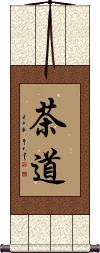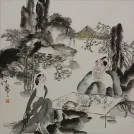Many custom options...
And formats...

Tea Ceremony in Chinese / Japanese...
Buy a Tea Ceremony calligraphy wall scroll here!
Personalize your custom “Tea Ceremony” project by clicking the button next to your favorite “Tea Ceremony” title below...
Elements of the Tea Ceremony
Wa Kei Sei Jaku
和, 敬, 清, 寂 or Wa, Kei, Sei, Jaku are the principles of the way of tea or 茶道.
The meanings are:
Harmony 和 (wa).
Respect 敬 (kei).
Purity 清 (sei).
Tranquility 寂 (jaku).
These principles or tenets were created by tea master Sen Rikyu (1522-1591). More about these ideas: Chanoyu
See Also: The Way of Tea
The Way of Tea
茶道 means The Way of Tea (literally, “tea way”) in Chinese and Japanese.
This may refer to a tea ceremony or a general lifestyle of tea preparation and drinking.
In Japanese, this can be pronounced sadō or chadō (seems that sadō refers more often to a tea ceremony, and chadō when it's the Way of Tea).
茶道 is also used in the Buddhist context with the same meaning as the Way of Tea.
This in-stock artwork might be what you are looking for, and ships right away...
Decorative Chinese Tea Philosophy Painting
Discounted Blemished
Gallery Price: $61.00
Your Price: $33.88
Gallery Price: $60.00
Your Price: $36.88
Gallery Price: $61.00
Your Price: $33.88
Gallery Price: $178.00
Your Price: $98.88
Gallery Price: $60.00
Your Price: $36.88
Not the results for tea ceremony that you were looking for?
Below are some entries from our dictionary that may match your tea ceremony search...
| Characters If shown, 2nd row is Simp. Chinese |
Pronunciation Romanization |
Simple Dictionary Definition |
茶道 see styles |
chá dào cha2 dao4 ch`a tao cha tao chadou / chado ちゃどう |
More info & calligraphy: The Way of Teatea ceremony; Way of Tea; sadō; (place-name) Chadō the way of tea |
和敬清寂 see styles |
wakeiseijaku / wakesejaku わけいせいじゃく |
More info & calligraphy: Elements of the Tea Ceremony |
卓 see styles |
zhuó zhuo2 cho masaru まさる |
outstanding (1) table; desk; (counter) (2) (たく only) counter for tables, desks, etc.; (3) (しょく only) {Buddh} offering table before an altar (sometimes used in tea ceremony); (4) (しょく only) (abbreviation) (See 卓香炉) tabletop incense burner; (given name) Masaru Lofty, tall erect. |
寮 see styles |
liáo liao2 liao ryou / ryo りょう |
hut; shack; small window; variant of 僚[liao2] (1) hostel; dormitory; (2) (archaism) (See 律令制) bureau (government department beneath a ministry under the ritsuryō system); (3) (archaism) (See 茶寮・1) tea-ceremony room; (4) (archaism) (See 別荘・1) villa; (surname, given name) Ryō A hut, study, monastery; fellow-student. |
棗 枣 see styles |
zǎo zao3 tsao natsume なつめ |
(bound form) jujube; Chinese date (Zizyphus jujuba) (1) (kana only) jujube (Ziziphus jujuba); Chinese date; red date; (2) small tea caddy (tea ceremony); (surname, female given name) Natsume |
翻 see styles |
fān fan1 fan hapaki はぱき |
to turn over; to flip over; to overturn; to rummage through; to translate; to decode; to double; to climb over or into; to cross (irregular okurigana usage) waste-water container (tea ceremony); (surname) Hapaki 繙 To translate, interpret. |
詰 诘 see styles |
jié jie2 chieh sakizume さきづめ |
(bound form) to question closely; to interrogate (n,suf) (1) stuffing; packing; (2) end (esp. the foot of a bridge); (3) lowest-ranking guest at tea ceremony; (4) tea master; (5) endgame (esp. in shogi or used figuratively); (6) (abbreviation) sweet eel sauce; (7) (archaism) middle-aged woman; (suffix noun) (8) appointment to a particular workplace; (9) using as the sole ground of judgement (judgment); (10) continuing; keep doing for period of time; (surname) Sakizume to reprove |
鐶 镮 see styles |
huán huan2 huan tamaki たまき |
(ancient weight); metal ring (1) ring; link; (2) open spirals of heavy metal wire twisted into a kettle and used to lift it (tea ceremony); (given name) Tamaki A metal ring; a ring. |
お茶 see styles |
ocha おちゃ |
(1) (polite language) tea (usu. green); (2) tea break (at work); (3) tea ceremony |
お詰 see styles |
otsume おつめ |
(1) lowest-ranking guest at tea ceremony; (2) tea master |
七事 see styles |
qī shì qi1 shi4 ch`i shih chi shih shichiji しちじ |
(archaic) the seven duties of a sovereign (abbreviation) (See 七事式・しちじしき) seven tea ceremony procedures of the Senke school |
仕服 see styles |
shifuku しふく |
silk pouch with drawstring for holding a tea caddy (tea ceremony) |
仕覆 see styles |
shifuku しふく |
silk pouch with drawstring for holding a tea caddy (tea ceremony) |
初座 see styles |
shoza しょざ |
(See 後座・ござ・2) first half of a tea ceremony (in which the charcoal is set and light food served) |
初釜 see styles |
hatsugama はつがま |
first tea ceremony of New Year |
千家 see styles |
senya せんや |
Senke school of tea ceremony; (personal name) Sen'ya |
台子 see styles |
daiko だいこ |
large utensil stand (tea ceremony); (female given name) Daiko |
呈茶 see styles |
teicha / techa ていちゃ |
(polite language) serving tea (esp. in tea ceremony) |
堺流 see styles |
sakairyuu / sakairyu さかいりゅう |
(1) Sakai school of tea ceremony; (2) Sakai school of calligraphy |
建水 see styles |
jiàn shuǐ jian4 shui3 chien shui kensui けんすい |
Jianshui county in Honghe Hani and Yi autonomous prefecture, Yunnan waste-water container (tea ceremony) |
待合 see styles |
machiai まちあい |
(noun/participle) (1) rendezvous; meeting; assignation; (2) area where guests gather before the start of a tea ceremony; (3) (abbreviation) waiting room; (4) (archaism) (abbreviation) meeting place for assignations, drinking, etc.; (surname) Machiai |
後座 后座 see styles |
hòu zuò hou4 zuo4 hou tso goza ござ |
back seat; pillion (1) main performance; headliner; (2) (See 初座) latter half of a formal tea ceremony (in which the tea is actually consumed) |
後炭 see styles |
gozumi; nochisumi ごずみ; のちすみ |
(See 後の炭) second adding of charcoal to the fire (in tea ceremony) |
御茶 see styles |
ocha おちゃ |
(1) (polite language) tea (usu. green); (2) tea break (at work); (3) tea ceremony |
御詰 see styles |
otsume おつめ |
(1) lowest-ranking guest at tea ceremony; (2) tea master |
懐紙 see styles |
kaishi; futokorogami かいし; ふところがみ |
(1) paper folded and tucked inside the front of one's kimono (esp. for use at the tea ceremony); (2) paper used for writing tanka |
昼餉 see styles |
hiruge ひるげ |
(1) lunch; midday meal; (2) food served at a tea party (tea ceremony) |
朝会 see styles |
choukai; asakai / chokai; asakai ちょうかい; あさかい |
(1) (See 朝礼) morning assembly; morning gathering; morning meeting; (2) (あさかい only) early morning tea ceremony (on a summer day) |
末客 see styles |
makkyaku まっきゃく |
(See 詰め・つめ・6,次客・じきゃく,正客・しょうきゃく・1) last guest (tea ceremony); third guest of honour (honor); guest who sits in the seat furthest from the host and assists in various ways |
松風 see styles |
matsukaze まつかぜ |
(1) (sound of) wind blowing through pine trees; (2) (まつかぜ only) (sound of) steam whistling in a kettle (at a tea ceremony); (3) (まつかぜ only) matsukaze; sugar-glazed cookie sprinkled with sesame or poppy seeds; (place-name, surname) Matsukaze |
Click here for more tea ceremony results from our dictionary
The following table may be helpful for those studying Chinese or Japanese...
| Title | Characters | Romaji (Romanized Japanese) | Various forms of Romanized Chinese | |
| Elements of the Tea Ceremony | 和敬清寂 | wa kei sei jaku wakeiseijaku | ||
| The Way of Tea | 茶道 | cha dou / chadou / cha do | chá dào / cha2 dao4 / cha dao / chadao | ch`a tao / chatao / cha tao |
Successful Chinese Character and Japanese Kanji calligraphy searches within the last few hours...




















